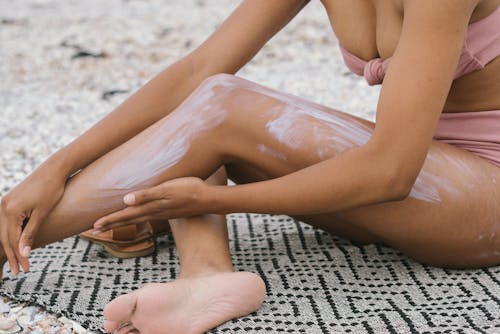Retinol in Summer: Is It Dangerous to Use?

Sticking to the same skincare routine year-round is easy, convenient, and familiar, right? That’s what I thought until recently. As I’ve learned and experienced, the hotter months demand a different type of care for your skin, especially when it comes to retinol in the summer.
Retinol Use in Summer Skincare

What works in the winter might not be suitable, or even harmful during the summer. One such ingredient sparking a lot of interest lately is retinol. Everyone is raving about its benefits. But is this powerhouse ingredient safe for summer skincare?
Let’s understand whether or not it should be part of your summer skincare routine.
Is Retinol Safe in Summer?

Good news for all retinol lovers: you don’t have to skip it during the warmer season!
Using retinol in the summer is safe with a few adjustments. The key is changing your application methods and following some do’s and don’ts to avoid sensitivity.
Let’s explore using it safely and effectively during the warmer months.
1. Be Cautious With Sun Exposure

What happens when you apply retinol during the day and step out into the sun? It increases your skin’s sensitivity to sunlight. This heightened sensitivity can lead to sunburn and skin damage if not properly protected.
Strategies to Use Retinol in Summer

Make sunscreen your best friend to protect your skin during the summer when using retinol. Apply SPF 50 or higher generously, and reapply throughout the day to ensure continuous protection. This will protect newly exposed skin cells, thanks to retinol’s exfoliating effect. Additionally, seek shade whenever you’re outside. Shade under trees, umbrellas, or any covering reduces direct sun exposure, minimizing the risk of UV damage and premature aging.
Additional Protective Measures

- Cover up with hats that provide broad brim coverage.
- Wear sunglasses with UV protection.
- Opt for lightweight clothing that covers arms and legs for added protection.
- Consider a scarf or shawl for extra coverage if needed.
Remember, the sun’s UV rays are strongest between 10 am and 4 pm. Hence, avoid prolonged exposure during these peak hours.
2. Apply Retinol in the Evening

While we’ve covered how to use retinol in the summer safely, some risks remain. I found that applying retinol during the day increased my skin’s sensitivity and caused redness.
Transition to Nighttime Application

Switching my retinol application from day to night has significantly improved my skin’s health and comfort. To ensure complete protection, I apply sunscreen generously each morning to guard against any potential sensitivity to sunlight caused by retinol.
3. Skip Retinol in Summer if You Are Sunburnt

When I experienced sunburn, even a light touch on my sensitive skin was painful. At that time, using retinol was a definite no-no. The irritation intensified, and my skin began to peel, making it clear that I needed to prioritize healing.
Importance of Recovery

It’s crucial to give your skin ample time to recover before reintroducing retinol into your skincare routine. Allowing your skin to heal not only prevents further irritation but also ensures that retinol can work effectively when you resume its use.
4. Opt for Mild Cleaners & Hydrating Moisturizers

When you’re using retinol in the summer, choose gentle cleansers and moisturizers. They not only keep your skin clean, supple, and hydrated but also boost the benefits of retinol.
Key Ingredients to Look for

Look for ingredients like ceramides and hyaluronic acid. They help keep your skin’s moisture intact, which is important when using retinol.
Consult Your Dermatologist
They can guide you on pairing retinol with compatible products and help you choose the right cleansers and moisturizers.
5. Avoid Using Peels or Exfoliants

Have you ever tried to enhance your skincare routine, only to end up with dry, flaky, and irritated skin? I once made the mistake of using peels and exfoliants while applying retinol, hoping to achieve smoother skin. Instead, my skin became sensitive, dry, itchy, flaky, and prone to irritation.
Retinol and Gentle Alternatives

Combining retinol with peels and exfoliants can strip away essential oils, leaving your skin vulnerable and uncomfortable. I learned the hard way to opt for gentler alternatives or natural options that are easy on the skin. Thankfully, you don’t have to make the same mistake. Look for soothing ingredients like aloe vera or chamomile. These will complement retinol use, providing a healthier, more radiant glow without discomfort.
6. Begin With a Low Concentration

If you are a beginner to retinol application, start with low concentrations of 0.01% to 0.03% to minimize irritation.
Starting the Right Way

If you’re new to retinol, starting in the winter might be better. This gives your skin time to adapt without becoming too sensitive to the sun. Be consistent; as your skin becomes used to it, you can gradually increase the concentration.
The key is to start gently and let your skin adapt naturally. Take care of your skin by starting with what’s best for you.
Remember, with a little caution and the right approach, you can enjoy the benefits of retinol safely in the summer months. Start low, protect your skin from the sun, and listen to what your skin needs. Here’s to healthy, glowing skin all year round!

